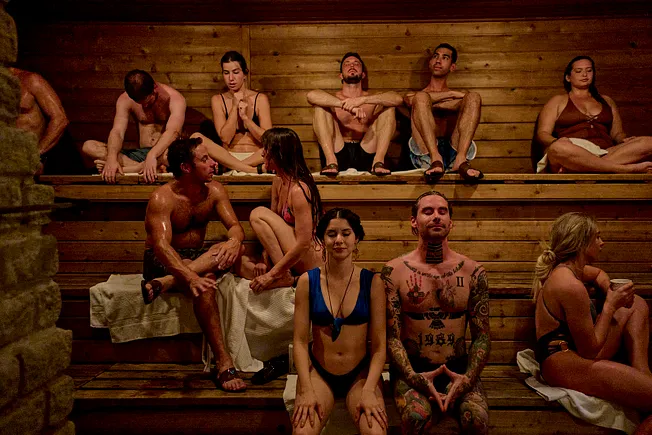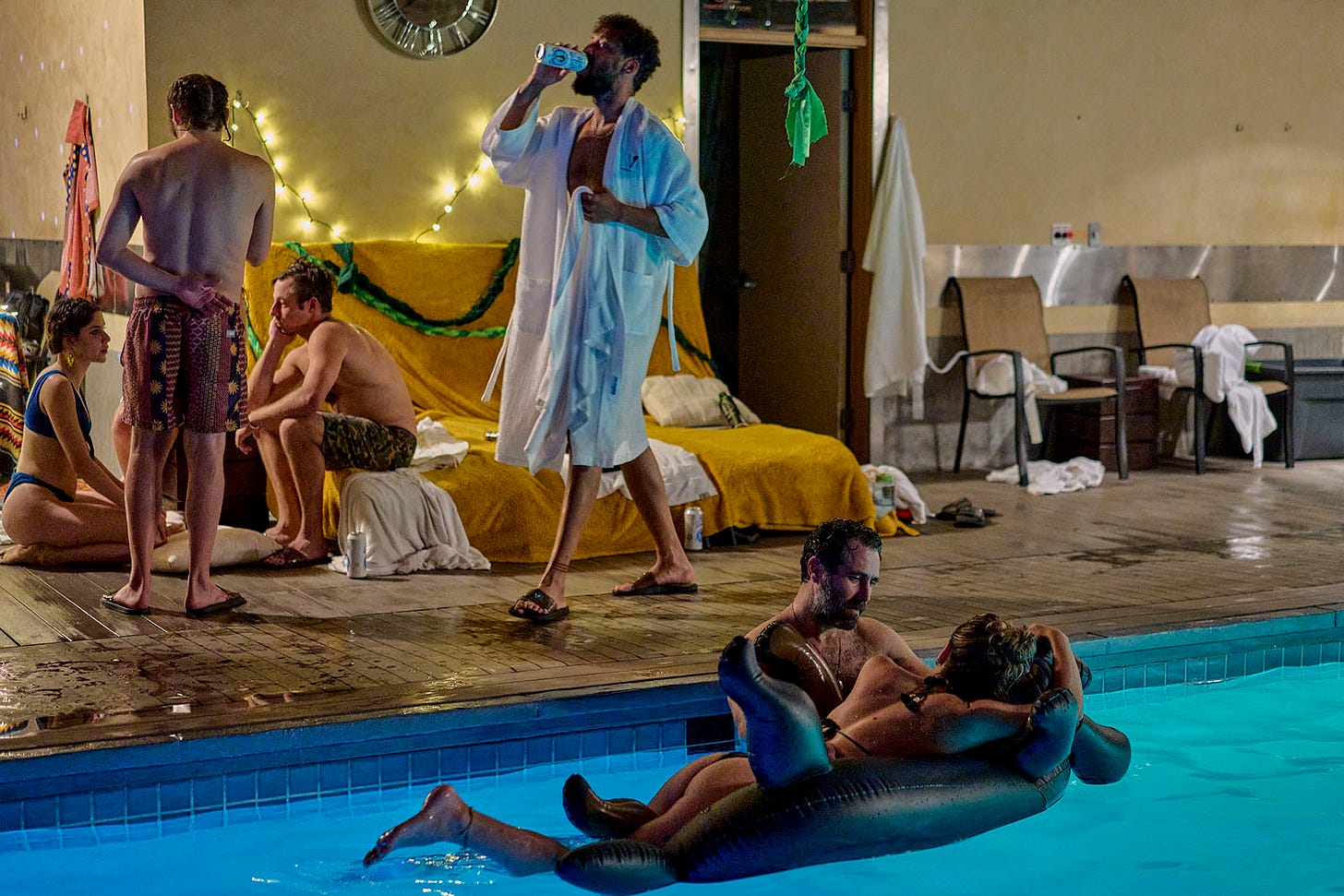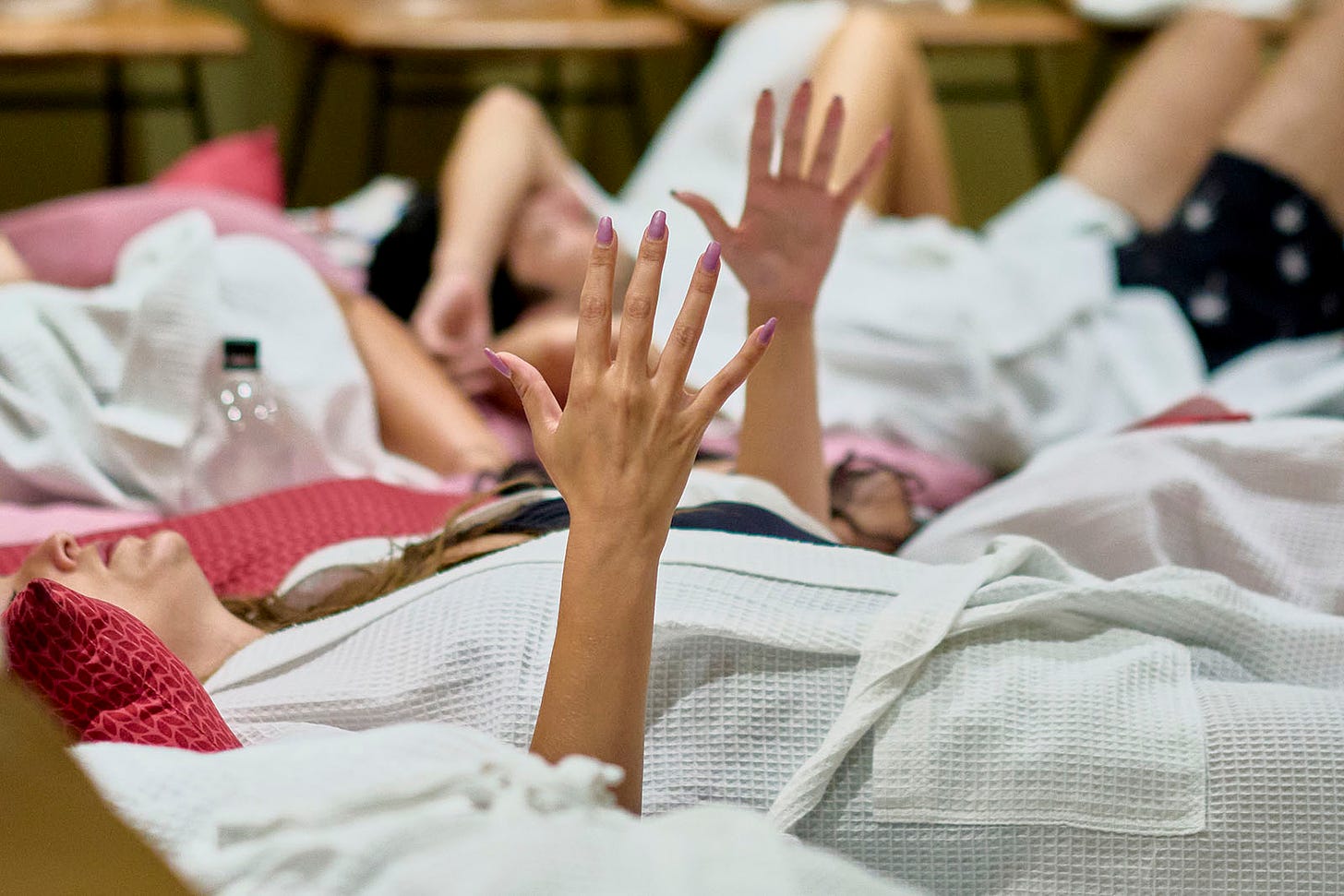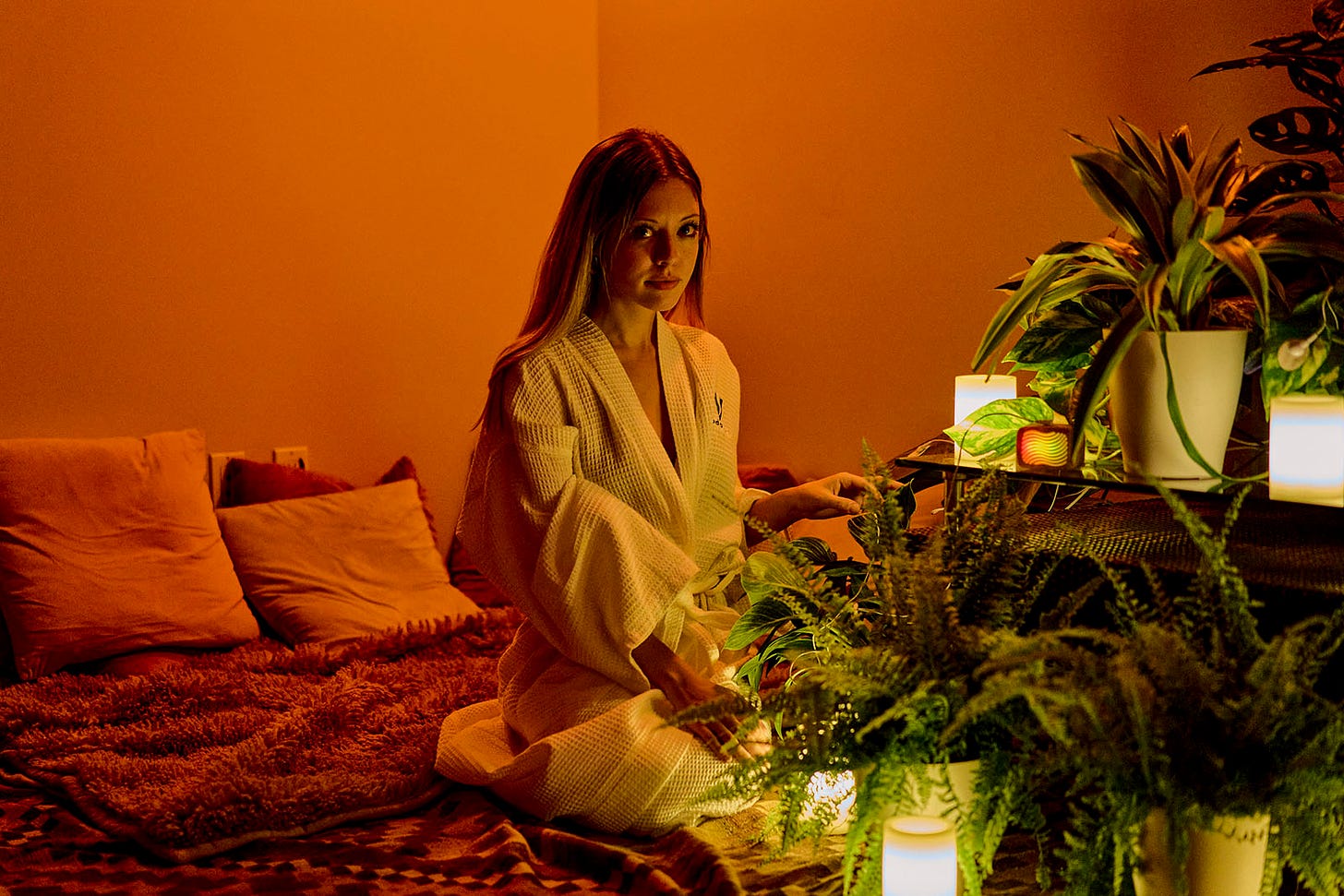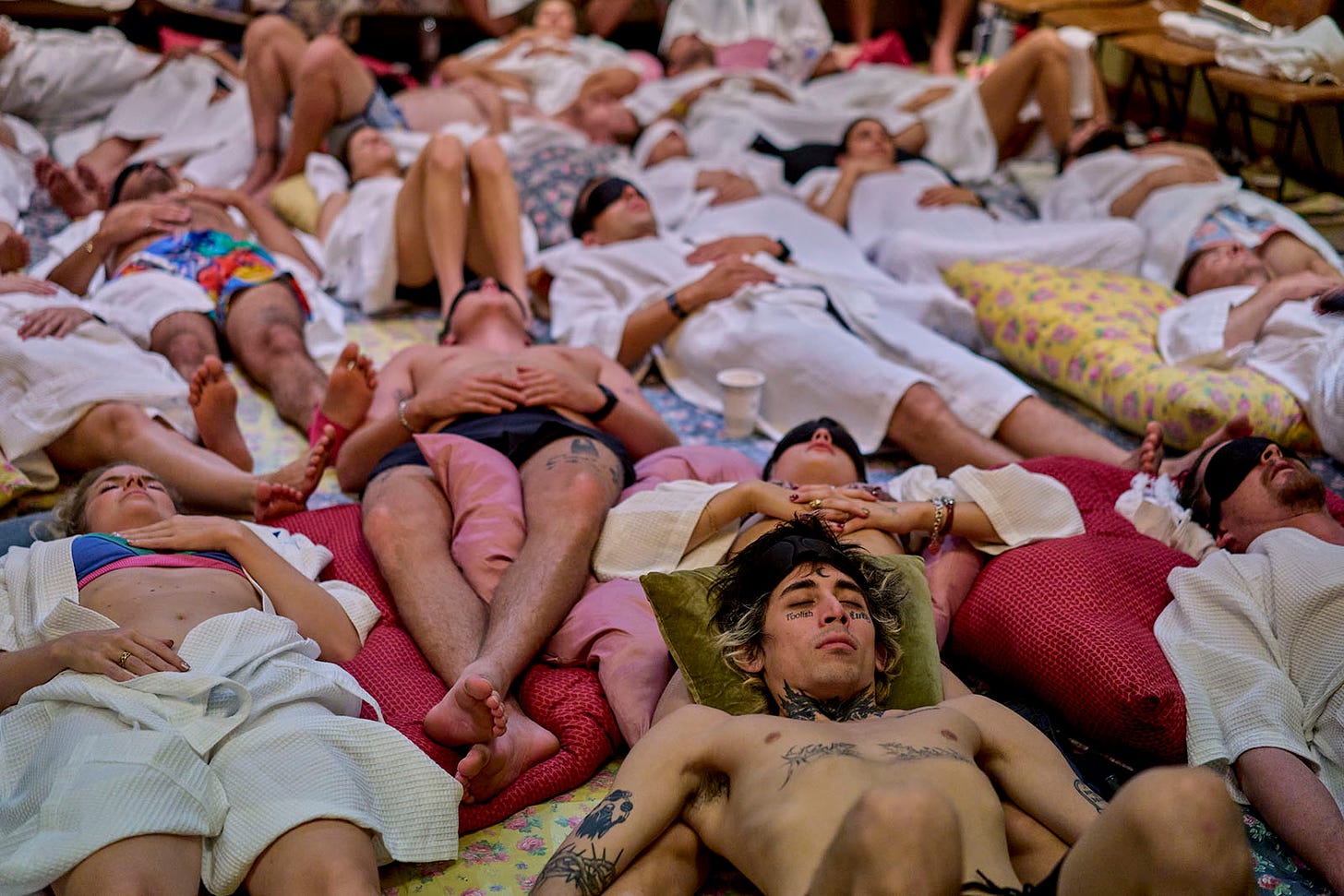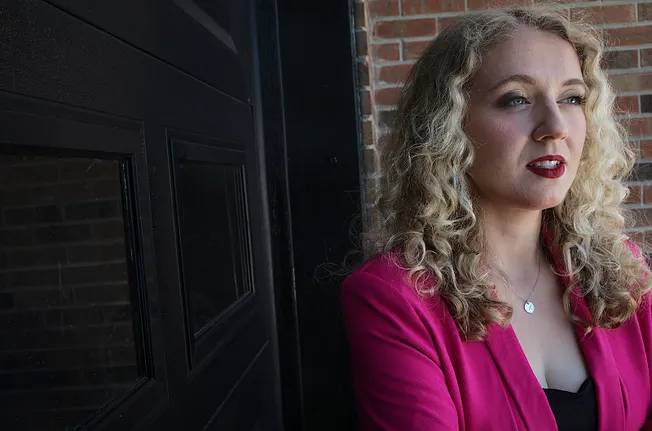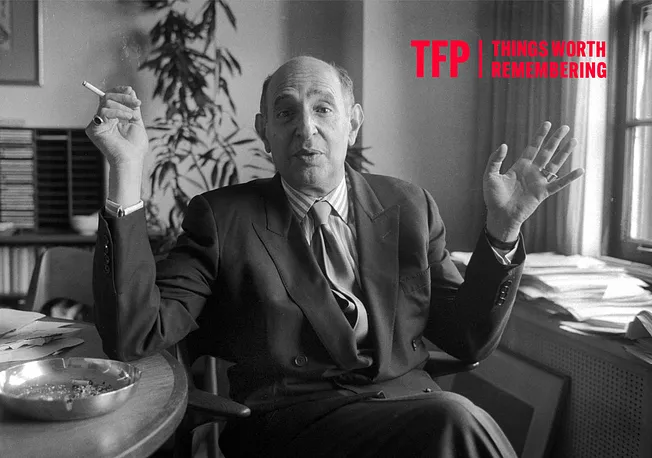LOS ANGELES — A woman dressed in a kimono tiptoes between the tattooed limbs of about fifty influencers, musicians, and yogis lying on the floor of a spa in West Hollywood. They’re in the homestretch of a breathing exercise that’s lasted twenty minutes. By now they’ve become one organism, breathing to the rhythm of a jungle beat on the stereo, their stomachs rising and falling like a hive mind.
“At the end of this,” the instructor prepares the crowd, “we’re going to have the opportunity to create sound—to move what needs to be moved.”
The participants, which includes one of Demi Moore’s daughters, a DJ with face tattoos named Diablo, the singer Kesha, and “Krotchy,” a model known for her two differently colored eyes, breathe more deeply into their white robes, creating a song on top of the song with their huffing: Oh-ah, oh-ah-oh.
Then the instructor, wearing silver hoops the size of cantaloupes, gives a quick countdown: “Three, two, one.”
Suddenly everyone is screaming.
Girls arch their backs and howl up at the ceiling. When a few run out of air, they almost moan. That’s when some start to clap; others cheer. And one man breaks through with the staccato call of a dolphin.
That last sound is emanating from Diplo, the Grammy award-winning DJ, supine on the floor with one hand draped across the chest of his musician pal Rhye, who has 2.5 million monthly listeners on Spotify.
“I started doing some animal noises at the end,” Diplo later explains when we’re in the sauna together. “The energy was strong.”
Welcome to Secular Sabbath, the members-only club that hosts bimonthly events, usually in Los Angeles but also in Iceland and Mexico City—and, at the end of the year, Antarctica. Colorful images of its young, beautiful (and sometimes famous) adherents have quickly spread the word of its mission on Instagram. For Genevieve Medow-Jenkins, the community’s 32-year-old founder, Secular Sabbath is a continuation of her youth spent at The Esalen Institute, a wellness retreat in Big Sur, California, which was famously portrayed in the final scenes of Mad Men.
Her parents were “bodyworkers” at Esalen, where her mother developed a new kind of massage “based on the atmosphere” and her father meditated, sometimes for days at a time. And even though she says most people raised in Big Sur never leave, she knew she had a higher calling.
“I knew that I had to share my upbringing with the world,” Medow-Jenkins tells me. “And Secular Sabbath is this chrysalis of what Esalen was in the ’90s, when I was growing up.”
She says Esalen has since become “commercialized,” selling workshops that last a few days but can cost upward of $10,000, unless you snag a “sleeping bag space” for a few hundred bucks. In 2016, she started distilling its spirit for a new audience, offering pop-up experiences at spas, Joshua Tree, and private homes. A $180 annual membership fee allows anyone to purchase a ticket to her events, which generally cost $75 to $400, and feature breathwork, cacao ceremonies, and soundbaths, often played by Rhye (real name: Michael Milosh).
The purpose of her Secular Sabbath sessions is to connect her “couple hundred” members to a higher power, at a time when attendance at religious services across the country is dwindling.
“I hope that they connect with a sense of purpose, through God or something greater than just themselves in this world,” she told me.
In other words, even though Americans are increasingly giving up on church, they’re still looking for God—even in a sauna with Diplo. Medow-Jenkins, who was raised Jewish, says she rarely goes to temple now, but still finds God all around her.
“The other day, I was upset about something. And in that moment, I asked God for help,” she says. “In moments of vulnerability, it always does in some way come back to God.”
Since the 1990s, the number of Americans who describe themselves as atheist, agnostic, or “nothing in particular” has more than doubled from 9 percent of the population to 21 percent, where it stands today. If the trend continues, Pew predicts that religious “nones” could represent a majority of the country by 2070. Part of what’s pushing people away from religion, Medow-Jenkins says, is its dogma—something that briefly soured her on Judaism when she was young.
Once, while visiting her Orthodox relatives in the Midwest, Medow-Jenkins remembers them asking her not to eat with them, because her Subway sandwich wasn’t kosher.
“It was so negative for me because it was so rule-bound,” she says. “And I knew when I created Secular Sabbath, I didn’t want it to have many rules. I wanted it to feel like you could be any version of something and still be included.”
There are no rules listed on the Secular Sabbath website. Though drugs or alcohol aren’t provided or encouraged at her sabbaths, Medow-Jenkins also says she won’t “take it away from them.” (And judging from the pure ecstasy of today’s crowd, it wouldn’t surprise me if the vibe is pharmaceutically enhanced). Her events don’t even have to occur on the Sabbath—this event, for example, is happening on a Tuesday night.
But she does try to steer clear from any connections to Western religions like Christianity, and instead borrows from Eastern traditions, because people are “more open to it.”
More than anything, she wants to dispel the idea that God is uncool.
“In American culture, we are so disconnected from feeling passionately about things—because it’s terrifying to care,” she says. “People are afraid to feel into spirituality.”
Inside the West Hollywood spa, women swaddled in robes are drawing a giant rainbow slug on a piece of paper laid out like a rug. Nearby, Juliana King, a blonde 37-year-old acupuncturist, says there was a time when the word God made her bristle.
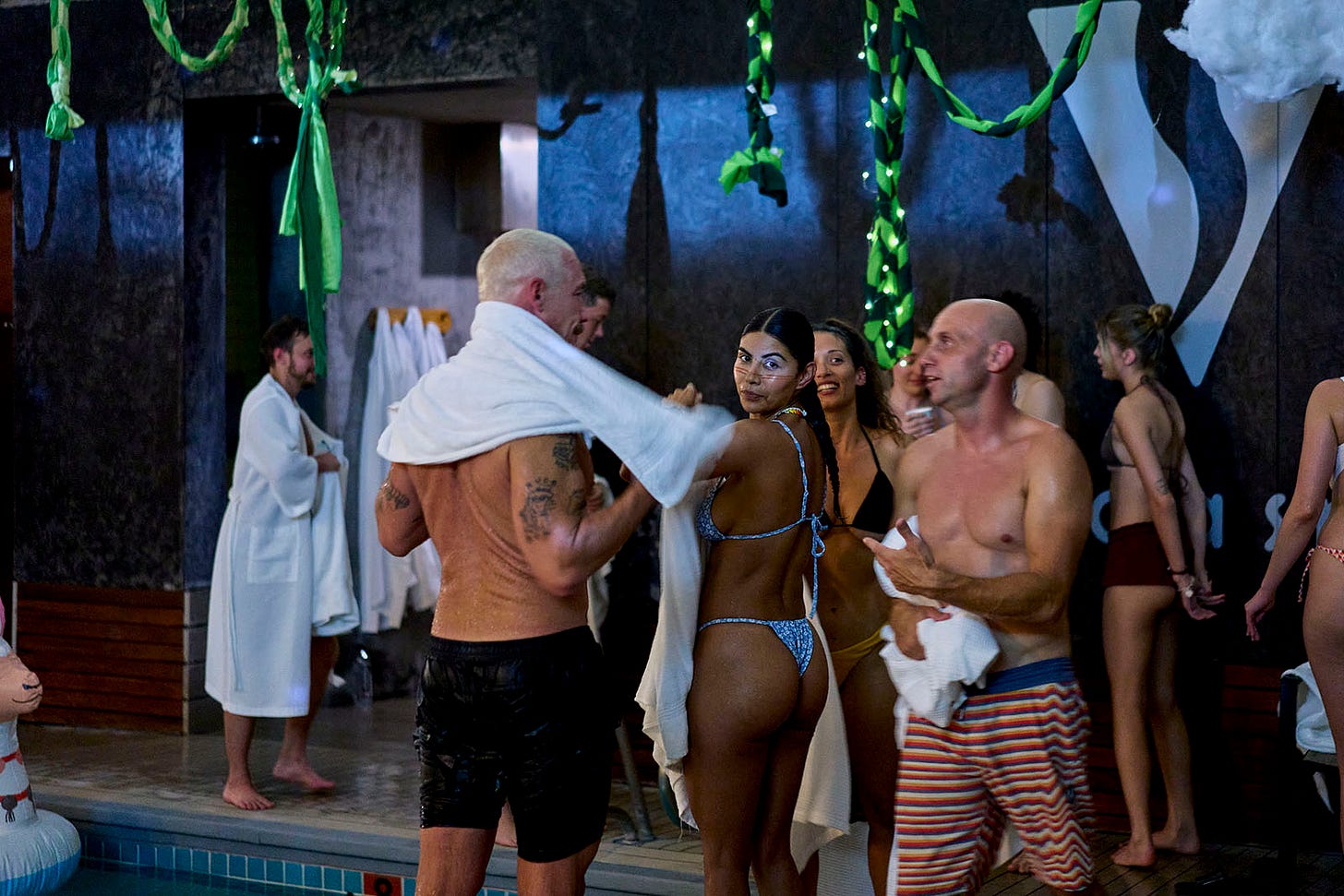
“I had to reclaim the word God,” she tells me, sitting by the pool, listening to Rhye, who’s ten feet in front of her humming into a microphone. “Because God felt like this man in the sky that tells you how to be, and so I was uncomfortable with the word for a long time.”
King, who has a hint of mascara smudged beneath her eyes after a cold plunge, tells me she grew up in Texas, by the Mexico border, in a small city of about 150,000 called McAllen. There, she attended a Presbyterian church.
“I technically went to church,” she says. “But it was just a place I showed up.”
Now, she says she’s a “cafeteria spiritualist” who picks and chooses which practices work for her.
“I want to find God and know God in my own way,” she says. “I don’t want anyone to tell me the quality of God or how to worship or anything, I want all that to be my own experience.”
Around the corner, a woman is tending to a “plant symphony”—a group of potted ferns and succulents attached to sensors, which track the movement of water through their systems, turning it into sound. The result is like the single note of an organ ringing out, punctuated by the twinkle of a chime.
“It feels like a natural high,” says the woman, who is wrapped in a spa robe, her light hair draped across her shoulders.
She tells me her name is Macy Baker, and she says ten years ago, when she was 18, she probably would’ve been at a bar by now, but the beauty of Secular Sabbath is it gives attendees an alternative to booze.
“I feel like we’ve put a lot of emphasis into unconsciousness, with alcohol and drugs and things, to ensure that we stay lost,” she says. “Like people could be out at bars, and instead they’re here at a spa, listening to plants generate music and doing breathwork and sipping cacao. How awesome is that?”
Then Baker meets my eyes in the dim light: “But now, we’re in this new great awakening.”
Three hours into the evening, there’s been no mention of God in the official programming. It feels more like Coachella than church. A brunette chases a man into the hot tub, asking, “Are you my soulmate?” Over in the pool, Scout LaRue Willis is floating atop six foam noodles, meditating with her eyes closed. A crowd in the steam room, led by Rhye, is singing variations of one line for thirty minutes: “Somebody to love.” They’re all drinking canned water, which one man describes as “magic.”
Tamara Rodriguez, a 33-year-old actress who was born in Mexico, watches the scene as she dangles her feet in the water. She says she knows how this all looks.
“Oh, these are just some Hollywood kids living their yoga life,” she imagines a stranger might say.
Hell, she even thought that when she came to her first Secular Sabbath, held at Joshua Tree. But then she dispensed with her judgment when she realized how good it all felt.
“The first time I saw pictures of this, I was like, mostly everyone is white, so you’re like, ‘What is this yogi community that’s trying to create—some sort of cool kids club?’ But then you go into it with an open mind and see through it.”
Now, she says, she considers Secular Sabbath a “church,” but the kind where no one has to say anything specific or meet a certain dress code to belong. In some ways, it’s similar to Hillsong, the evangelical megachurch in Hollywood that once attracted Justin Bieber, Kevin Durant, and Kylie Jenner with its emphasis on rock music and a party atmosphere. Although that movement died down after its pastor became the subject of multiple scandals, including cheating on his wife, its lesson prevails: people will come to church, if it’s a place to be seen.
“This is, like, take off the clothes of your day and be more you,” Rodriguez added. “Be more human, authentic, so you can return to the world and something more truthful to you.”
Back in the sauna, I’m sitting in the dark on a wooden bench with Diplo, who is still in his khakis, Crocs, and t-shirt. He tells me that he grew up attending an Episcopal church back home in Daytona Beach, Florida, when he was still known as Thomas Wesley Pentz, and even now, at 44, he looks to Jesus Christ as an inspiration.
“He was a perfect person. He was kind. His ambition was to be the best person you could be.”
Since his mom and sister passed away recently, he says he’s been back in church. But he doesn’t believe God can be found only there.
“Everyday is church for me,” he tells me. “I’m always like, at the club”—then he cocks his head to think. “That is the church because people go there to deal with their problems.”
He adds: “Anything that makes you feel like you’re celebrating life is a church.”
Olivia Reingold is a writer for The Free Press. Read her dispatch from the Asbury Revival, “Why Students in Kentucky Have Been Praying for 250 Hours.”
And to support more fresh takes on the culture, become a Free Press subscriber today:


